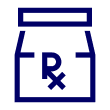Being diagnosed with lung cancer can feel overwhelming, and you may be experiencing a wide range of emotions. This website is here to help support you as you navigate your diagnosis, including helping you understand what type of biomarkers you might have and how they could impact your treatment plan.
Your doctor has probably done a lung biopsy to determine the type of lung cancer you have. This tissue acquired during a lung biopsy can also be used for biomarker testing.
Many people with non–small cell lung cancer have biomarkers. While not all patients with mNSCLC have biomarkers, if they are present they can help inform treatment decisions. It’s important that anyone with an mNSCLC diagnosis has comprehensive biomarker testing.

What is a biomarker?
Cancer biomarkers are genes, proteins, or other substances that can be tested to reveal important details about a person's cancer.
How common is it to have a biomarker in metastatic non–small cell lung cancer?
In patients with mNSCLC,
60%
have a biomarker that could inform treatment decisions

Some common biomarkers you may hear about are*:
KRAS
EGFR
MET
BRAF
ALK
HER2
ROS1
RET
NTRK
*Not a complete list of known biomarkers in mNSCLC.
Once you know your biomarker status, you can discuss which therapy may work best for you. Even if you do not test positive for a biomarker, knowing your status can still help give your care team valuable information. Make sure to work with your doctor to understand all your treatment options before making a treatment decision. Your doctor may recommend a targeted therapy, either alone or in combination with another treatment.
Researchers have made great progress in identifying and understanding biomarkers in mNSCLC, which has resulted in many new therapeutic options. Targeted therapy is a precise type of cancer treatment that identifies and attacks specific parts of cancer cells. It's important to know that some of these targeted therapies may also affect healthy cells.
Surgery
Radiation
Chemotherapy
Targeted therapy
Immunotherapy
All treatments come with their own benefits and risks—your doctor can provide you with further information on them.
Use the questions below to help discuss with your doctor what factors are most important to you in treating your lung cancer. Ask your doctor to list all treatment options that you might be eligible for.

Ask your doctor how your biomarker results may affect your treatment options
Potential treatment options
How are these treatment options administered, and how often?
Potential Treatment benefits
How effective is this treatment for my type of lung cancer?
Will this treatment help if my cancer has spread or may spread to the brain?†
How long should I expect to be on this treatment?
What are the next steps if this treatment does not work or stops working?
Possible side effects
What are the most common side effects with this treatment?
Support services
†Brain metastases can be more common in some lung cancer types than others.
Always confirm next steps with your doctor before leaving their office.
Below are some typical steps in the diagnostic and treatment journey. Not everyone will go through the steps in this order; your own journey may look different. Explore this graphic to learn more.

Signs and symptoms
Every cancer is unique—just like every individual. Common signs and symptoms of mNSCLC are shown below, though your symptoms may be different. You may not have symptoms until after the cancer has spread to other parts of the body.
A cough that doesn't go away
Shortness of breath
Chest pain that gets worse with deep breathing, coughing, or laughing
Weight loss without trying
Coughing up blood
A weak or tired feeling

Appointments
Make an appointment with your doctor. Your doctor will likely recommend referral and/or tests to understand the cause of your symptoms and make a diagnosis. Everyone's journey is different and it may take several appointments and tests to reach a full diagnosis.

Diagnostic tests
Tests can include blood work, scans (CT, MRI, and/or PET), and biomarker testing. Based on test results that suggest lung cancer, you will be referred to an oncologist.

Meet to discuss treatment options
You can discuss treatment options with your oncologist/doctor. You and your doctor can make treatment decisions together.

Treatment
You will start your treatment soon after you receive your mNSCLC diagnosis, preferably after your biomarker results are in, which will help guide the most appropriate treatments.
Ongoing treatment and monitoring
Once you start your treatment, you and your doctor will evaluate how well the treatment is working, discuss any side effects you are experiencing, and decide whether any changes or other treatment options are needed. Regular visits may include blood work and scans. Some people may benefit from additional services, such as dietary support or palliative care, to help manage symptoms.
Review this checklist to help prepare for your next doctor visit.
Download
This guide includes questions to ask yourself and your doctor, and can help support you taking an active role in treatment decisions.
Download
If you’re looking to find the latest cancer research or helpful support communities, here are some third-party resources to check out.

American Cancer Society
www.cancer.org
The American Cancer Society (ACS) is a leading cancer-fighting organization with a vision to end cancer as we know it, for everyone. We are improving the lives of people with cancer and their families as the only organization combating cancer through advocacy, research, and patient support, to ensure that everyone has an opportunity to prevent, detect, treat, and survive cancer.

GO2 for Lung Cancer
www.go2.org
GO2 for Lung Cancer relentlessly confronts lung cancer on every front, every day, for everyone. Founded by patients and survivors, they are dedicated to increasing survival for those at risk, diagnosed, and living with lung cancer.
They are the go-to for one-on-one assistance, supportive connections, treatment information, and finding the best care close to home.

Lung Cancer Foundation of
America
www.lcfamerica.org
Lung Cancer Foundation of America is working to change the public perception of lung cancer through education and personal stories about lung cancer and to improve patient outcomes through funding impactful research

Lung Cancer Research Foundation
www.LCRF.org
The Lung Cancer Research Foundation focuses on funding research for the prevention, diagnosis, treatment and cure for lung cancer, providing awareness and educational programs supporting the lung cancer community.

LUNGevity Foundation
www.lungevity.org
LUNGevity Foundation is transforming what it means to be diagnosed and live with lung cancer. LUNGevity seeks to make an immediate impact on quality of life and survivorship for everyone touched by the disease through research, community, and advocacy.
CT=computed tomography; FDA=US Food and Drug Administration; MRI=magnetic resonance imaging; PET=positron emission tomography.